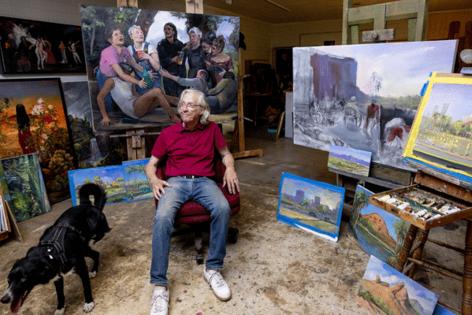This artist sued to remove homeless people. They also have been his friends and inspiration
Published in Lifestyles
Artist Joel Coplin has spent the better part of three years painting what he sees through the window of his studio:
A woman showering with a hose beside barbed wire; a body lying still at an intersection under a streetlight.
Then there's an unfinished piece he calls "The Land of Nod," an homage to the men and women who seem to defy gravity as they come down from the effects of opioids.
It's part of a complicated relationship Coplin has with Phoenix's homeless population, a mix of compassion and frustration.
He and his wife, fellow artist Jo-Ann Lowney, maintain a gallery in an area known as the Zone, about 15 square blocks on the edge of downtown that has been the fulcrum of the city's clashes over homeless policy. They live above the gallery, making up about half of the housed population in the area.
Coplin, 69, has helped homeless people with food, money and medical bills. He has paid them $20 to sit for portraits, to tell their stories and to listen to his.
But he also has had his face punched and glasses broken when he went to find one of his homeless friends. And he has been a plaintiff in a lawsuit that has forced the city to clear the encampments that were once so prevalent he could not open his downstairs gallery for two years.
"It just ballooned into this incredible, like, barter town," he said. "They built edifices out of the tents that were like three deep, and 50-gallon drums at night with flames coming out of it — you know, cooking and music and singing and dancing. It was just like an incredible street fair — 24/7."
Coplin moved to this property six years ago after selling his old art studio, east of the city. It was cheap and he liked the neighborhood's edginess. He had spent a decade in New York's Hell's Kitchen and got used to "stepping over people and junkies and all that."
People slept on the street beside the gallery when he moved in, but they had no tents and would leave during the day, he said. He helped his neighbors buy things and let them use his bathroom, "sort of like a little community."
...continued
©2024 Los Angeles Times. Visit latimes.com. Distributed by Tribune Content Agency, LLC.







Comments